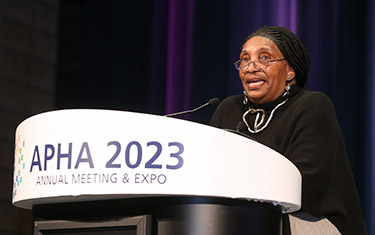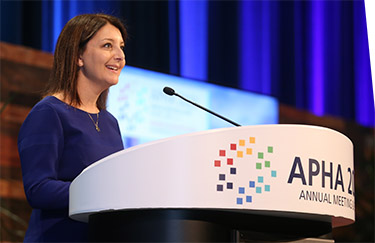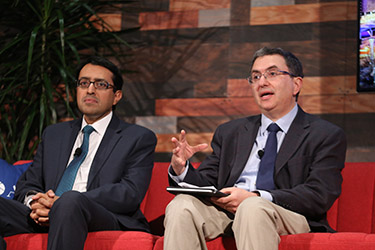Public health leaders shared their vision and recommendations to reimagine the U.S. public health system during Wednesday’s APHA Closing Session “Looking Ahead: The Steps Needed to Transform the Public Health System.”
The invited panelists were involved in producing three national reports that called for revamping and modernizing public health. Before the discussion, Mandy Cohen, director of the Centers for Disease Control and Prevention, also called for a new approach to public health and shared three core lessons from the COVID-19 pandemic that she is focused on at the CDC.
‘Nontraditional’ grassroots president takes APHA office
But first, to close out the Annual Meeting, Outgoing APHA President Chris Chanyasulkit handed over the ceremonial gavel to Incoming President Ella Greene-Moton. Moton received a standing ovation, along with boisterous cheers and applause. Moton said she recognized “unapologetically” that she is “the most nontraditional person to be elected to this office in APHA’s 150-year history.”
nontraditional person to be elected to this office in APHA’s 150-year history.”
Moton is an older Black non-degreed woman who was born on a cotton plantation in the Mississippi Delta. She moved up in public health through the grassroots movement. She has an extensive background in public health advocacy, public health policy, and community-based participatory research and programming, spanning more than 40 years Flint, Michigan.
“I am honored and humbled to have been recommended, considered, nominated and ultimately elected in 2022 to serve in this coveted three-year position.…I stand in this space proudly recognizing and celebrating the awesomeness of this moment.”
Moton’s presidential platform will center on three pillars: strengthening the public health workforce, increasing the alignment among APHA units, and continuing to push for a deeper dive into “unmasking the institutional structural and systemic racism.”
CDC director speaks to APHA members
Cohen thanked APHA members for their dedication and hard work.
“The level of service represented in this room, and online, is hard to fathom, and I just want to thank you,” she said.
 She continued, “We are in unprecedented times, and that requires us to meet this moment with a modernized approach to public health. In today’s globalized world, we face major challenges at our doorstep; yet we also have incredible opportunity ahead.”
She continued, “We are in unprecedented times, and that requires us to meet this moment with a modernized approach to public health. In today’s globalized world, we face major challenges at our doorstep; yet we also have incredible opportunity ahead.”
The question, she said, is: What does the CDC and public health need to do to meet this new moment?
“I believe that starts with a CDC that is trusted and highly effective and a CDC that is deeply embedded in a larger integrated system that protects the public’s health,” she said. “We are laser-focused at the CDC on delivering on that vision, and it starts with building and maintaining trust, because without trust, we don’t have that critical foundation for a healthy society.”
Three areas the CDC is focused on stem from lessons learned during the COVID-19 pandemic, she said. These are to be transparent, which includes stepping up the pace and accessibility of communication; to focus on operational excellence so that protecting health is simple and easy for people; and building relationships and partnerships.
“Protecting public health is a team sport, and we have to be working hard to build relationships, importantly building an aligned agenda across different entities….To meet this moment, I believe we truly need an integrated system to deliver and protect health, not a reactive health care system and a separate siloed public health system, but one system.”
Panelists outline a new public health system
After Cohen outlined her vision for CDC, panelists highlighted ways they believe public health should transform. The panelists and reports that they contributed to were:
The starting place for the “Meeting America’s Public Health Challenge” report, in the wake of the COVID-19 pandemic, “is that many other countries had a public health system that they relied on, and the United States had its haphazard collection of state and local health departments and federal entities all jostling against each other and no real coherence,” Sharfstein said. 
The report recommends the creation of a new deputy secretary for health position at the U.S. Department of Health and Human Services, as well as a standing council of representatives from state, local and territorial health departments that could be the “heart” of a national public health system working with HHS leadership. The report also calls for sustainable guaranteed public health funding, integration with the health care system, and HHS transparency and accountability.
The impetus for the “Building the CDC the Country Needs” report, Ingelsby said, was the concern that CDC was under assault during the pandemic. Report recommendations include a CDC that focuses on strengthening external partnerships — including placing many more of its staff in the field at the request of state and local health departments and much more interaction between those departments and the CDC.
The report also called upon CDC to improve its communications strategy and data gathering and integration and to change its career incentive structure. Ingelsby said many believe that the agency has shifted too much to an academic or research reward system and needs more “in the field” operators.
As a grassroots leader, Greene-Moton implored federal agencies to improve their funding cycles, by releasing money faster and providing funds for a longer period.
“In many communities we have programs that we initiate, and when the funding is gone, that program leaves, and, for us, the program is working,” she said. She called for a “longer-term funding process, rather than have them talk about ‘new and innovative’ — I’ve learned to hate those words — to continue the programs that work in our communities.”
Despite — or maybe because of — the challenges, the panelists agreed that public health must transform to meet the needs of the 21st century.
“There are huge challenges in our society that are complicating our ability to do our job,” Sharfstein said. “We like to think of ourselves (in public health) as the dog, but sometimes we’re getting wagged….And we all have to keep fighting for” public health.
Photos: APHA President Ella Greene-Moton; CDC Director Mandy Cohen; Anand Parekh and Joshua Sharfstein. Photos courtesy EZ Event Photography.